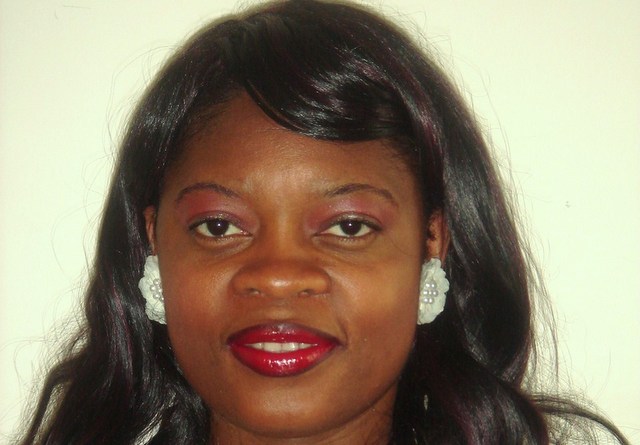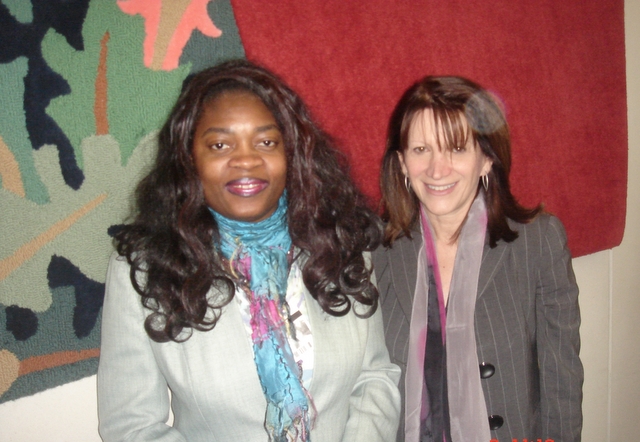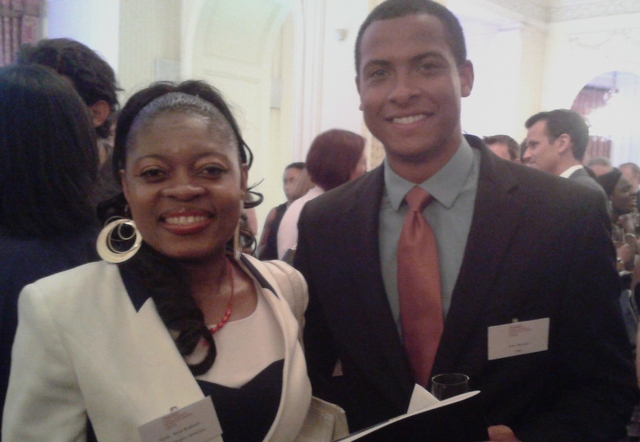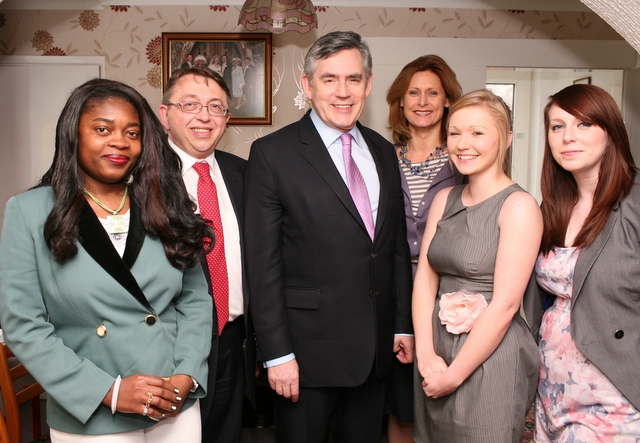Interview of the Month
Sylvie Aboa-Bradwell is the Founder and Executive Director of the Policy Centre for African Peoples (PCAP). She has an MPhil in Post-Colonial Studies and an MA in English from the Complutense University of Madrid, and a Diploma in Development Studies from Birkbeck, University of London. Sylvie created PCAP to provide a platform for the engagement and education of African communities and key stakeholders on topics that are of relevance to Africans in the United Kingdom, Africa, and all over the world.
Before founding PCAP in 2008, Sylvie served as UK Co-ordinator of the Centre for Democracy and Development, a non-governmental organisation that promotes sustainable development and democracy in Africa. She also worked for several institutions catering to African communities in Spain first and, subsequently, in the UK.
Sylvie is a firm believer in entrepreneurship as a powerful agent for development. As a Board Member of the UK-based Association for African Owned Enterprises, she strives to nurture a more propitious environment for business in Africa by raising awareness of the acute need for greater social responsibility from the businesses and corporations operating in this continent, due to the newness and fragility of African states. Sylvie is also the CEO of Medzan Lifestyle Ltd, a company she recently created to promote her Medzan Lifestyle Programme.
Through her work, writings, lectures, television and radio interventions, Sylvie has long been a strong advocate of development, education, human rights and good governance in Africa, the UK, and elsewhere. Her dedication to these causes has brought her international recognition. She was included in the anthology African Women Writing Resistance: Contemporary Voices, published by the University of Wisconsin in 2010. Furthermore, Sylvie was short-listed as ‘Author of the Year’, ‘Career Woman of the Year’ and ‘Role Model of the Year’ for the 2013 Women for Africa Awards, and won the African Diaspora’s 2013 Community Hero Award. She was also recently appointed a Board Member of the African Democratic Institute.

Question 1 - The African Peoples Advocacy was founded in 2008 to provide a platform for the engagement and education of African communities and key stakeholders on topics that are of relevance to African peoples and the African continent. Could you tell us a bit more about it?
Response: The reason for the creation of African Peoples Advocacy was that I and a group of like-minded individuals, mainly members of the African Diaspora, wanted to enable African voices to be heard in the UK and elsewhere. Initially, our work consisted in advocating on issues such as the immigration detention of African children, and the civic engagement of African communities. However, our activities have expanded so much that we now operate as a centre of ideas, a think tank that carries out research, organises debates and hosts events on topics including African development, social justice, race and gender equality, and education. It is to reflect this state of affairs and highlight the status of our organisation as a think tank that African Peoples Advocacy was renamed Policy Centre for African Peoples (PCAP) a couple of months ago. Membership of PCAP is free and open to all individuals regardless of race, religion, gender or nationality. To become members of PCAP, all people need to do is subscribe to our newsletter on our website, and participate in our events and activities whenever they can.
 Sylvie with UK Minister for Women and Equalities Lynne Featherstone in February 2011
Sylvie with UK Minister for Women and Equalities Lynne Featherstone in February 2011
Question 2 - How is the African diaspora contributing to the continent’s growth?
Response: I believe that just as the African Diaspora played a key role in bringing about the decolonisation of the African continent in the past, current members of the Diaspora with links to African countries could prove crucial in either triggering or supporting the positive transformation of Africa in many areas, including economic growth and development. Remittances from the Diaspora are currently an important factor in the economies of a lot of African countries, and there is a school of thought that regards remittances as conducive to African development. But I do not concur with that view, as I do not think that migration can provide long-term solutions to the economic and other challenges of developing nations.
Rather than relying on the money that migrants send back home, African states should strive to create the economic, social and political environment that will enable their sons and daughters to flourish and build their nations, instead of compelling them to migrate in order to fulfil their aspirations. I am very pleased to see that many members of the African Diaspora are already contributing to the creation of such an environment. For instance, through his Mo Ibrahim Foundation, the Sudanese-British entrepreneur Mohamed Ibrahim is promoting African development, good governance and responsible leadership. Another example is the music star Youssou N’Dour who, despite spending a lot of time living abroad, has proved instrumental in boosting entrepreneurship, democracy and freedom of expression in his native Senegal. I am also delighted to say that we too at PCAP are doing our bit to boost African development through entrepreneurship: we have an on-going project called Pitching Africa, which gives budding entrepreneurs and people with business ideas promoting African products a platform to pitch these ideas to potential investors.
Question 3 - In October 2010, the AU launched the African Women's Decade, what are you thought regarding this decade?
Response: I long for the time when an African Women’s Decade would no longer be deemed necessary. But I acknowledge that right now, this is indispensable in order to raise awareness of the need for women’s rights and the empowerment of women in Africa, so I think it is a laudable initiative, and I applaud the African Union for its leadership on the issue of gender equality in our continent. However, concrete measures are required for this initiative to have positive results and leave a lasting legacy. For instance, research constantly shows that women who are educated and have economic independence are far more likely to assert and protect their human rights. It would be excellent if the AU could use the African Women’s Decade as a springboard to obtain and dedicate more funds to the promotion of women’s education and entrepreneurship programmes all over Africa. Political engagement of women is another area where more progress is urgently needed in the African continent. The AU and other bodies interested in African women’s empowerment should have more projects aimed at boosting the political participation of women. While all African states cannot be like Rwanda (Rwanda is the only country in the world where women form a majority in parliament), a lot of lessons can be learnt from this nation, and replicated in other African countries.
Question 4 - The women's movement on gender equality and empowerment has been on the upward trend in Africa in recent times, what is the Policy Centre for African Peoples doing to make every woman count?
Response: PCAP’s main aims include the promotion of gender equality, so this is a key area of work for us. We preach a lot by example. For instance, the fact that the founder and director of PCAP is a woman should encourage other African women to seek to realise their dreams. Furthermore, throughout its existence, PCAP has recruited and trained many women through its internship and volunteering programmes. PCAP is also constantly using its newsletters to advertise scholarships, events and activities undertaken by organisations and institutions that promote gender equality. However, we know that despite the encouraging upward trend you mentioned, there is still a long way to go before true gender equality becomes a reality in Africa. As a platform for African communities, PCAP is only as strong as African communities’ members will enable it to be. We cannot do everything alone. This is why we urge all individuals and organisations that are eager to advance gender equality in Africa and make every woman count to contact us, join forces and collaborate with us in any way they can.
 Sylvie with CNN Presenter Errol Barnett in July 2013
Sylvie with CNN Presenter Errol Barnett in July 2013
Question 5 - Women represent half of the population in Africa, however, access to justice, decision-making position and economic empowerment remains a mirage for many women in Africa. What can be done to remedy the situation?
Response: Many things could be done to improve the situation of women in Africa, but I would restrict myself to three main recommendations for the sake of concision. First of all, we must realise that misogyny and discrimination against women are universal tendencies, not specific to Africa. Therefore, we can and should take inspiration from what has been done in other places to empower women and advance gender equality. For instance, in many developed countries, the education of women has enabled them to achieve better access to justice, healthcare, decision-making positions and economic empowerment. So the education of women, not only academically, but also in terms of raising their levels of awareness of their human rights, should be prioritised in Africa too.
My second recommendation would be for Africans to acknowledge and preserve centuries-old African traditions that were beneficial to women. For instance, the current biggest threat to millions of African women’s rights, be it education, access to justice, or even freedom of expression through clothing, is the financial, mental and spiritual colonisation coming from the Middle East. For centuries, in Nigeria, Mali and many other African territories, people have been practising an enlightened form of Islam respectful of African traditions in terms of men and women being educated, singing, dancing and not debasing the female body by treating it only as a sexual object that must be covered and hidden. But there are now barbaric practices being imposed there by radical Islamic groups whose financial resources and spiritual inspiration often emanate from the Middle East. We must be brave and ready to challenge these alien practices that are threatening African women’s rights.
My final recommendation would be that we must applaud, highlight and emulate the positive examples set by some African states. I have already mentioned Rwanda in terms of political empowerment of women. It is really amazing for a country that has experienced a vicious civil war to overcome such a trauma within a few years and become the only state in the world where women outnumber men in parliament. It can be argued that this is because many men were killed during the war; but many European men were killed during World Wars I and II, and yet, women are still woefully underrepresented in most European parliaments. So may more African nations follow in the footsteps of Rwanda! In terms of economic empowerment, Nigeria has good initiatives to promote entrepreneurship amongst women, and other African countries should implement similar initiatives.
Question 6 - What advice do you have for African women and girls on the continent and in the diaspora?
Response: My advice to African women and girls would be never let your gender restrict you in any way. If you have a dream you want to pursue or a vision you want to realise, go for it and do not let anything or anybody discourage you. I would also add that the world does not owe you anything just because you are a woman: be prepared to work hard and overcome many obstacles to fulfil your ambitions. Finally, People usually see African communities in terms of the challenges facing them. But my advice is that these are not challenges. These are circumstances full of potential and opportunities: the opportunity to be a leader in the field of gender equality if you are coming from an African country where women face discrimination; or the opportunity to be your country’s first female billionaire if you are an entrepreneur. So I urge African women and girls to take advantage of all these opportunities, become agents of positive change, and whatever change they want to achieve, they should always ask themselves: “If not me who, and if not now when?”
 Sylvie with UK Prime Minister Gordon Brown (centre) in April 2010
Sylvie with UK Prime Minister Gordon Brown (centre) in April 2010
Question 7 – 2013 is about to end; what are your projects for 2014?
Response: At PCAP, we are eagerly looking forward to hosting our 2nd African Diaspora New Year Lecture in January 2014, and the 2nd African Diaspora Summer Festival in June or July. We also plan to organise many Pitching Africa sessions, to give individuals with business ideas promoting African products a platform to pitch these ideas to potential investors, and your readers are welcome to contact us. Aside from PCAP, I look forward to contributing to the promotion of good governance and social justice in Africa through my work as a Board Member of the African Democratic Institute, a think tank based in South Africa. I am also very excited at the prospect of formally launching Medzan Lifestyle Ltd, a company I have just created to promote a fitness and meditation programme based on African culture.
Contact address:
Website: www.apadvocacy.org (until end of October 2013), www.policycentrefap.org (from November 2013 onwards)
Email: This email address is being protected from spambots. You need JavaScript enabled to view it. (until end of October 2013), This email address is being protected from spambots. You need JavaScript enabled to view it. (from November 2013 onwards).
Tel: (+44) (0) 1634 5736 19
Twitter: @ChantalAboa
